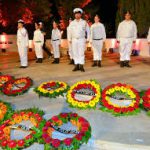With the possible exception of Yom Kippur, no date in Israel’s national calendar is more solemn than Yom Hazikaron, the day of memorial for those who have perished in defense of the state since its founding. Like all national memorial days, its observance is marked by ceremonies and rituals that unite the citizens in mourning for the fallen. The most dramatic of these is the sounding of a siren throughout the land for a duration of one minute in the evening and two minutes in the morning, a signal that summons the entire population to stop whatever they are doing to stand in silent tribute and reflection. That drama, unfortunately, does not impress everybody. For example, there are ḥaredim who have never reconciled with the creation of the Jewish state. They refuse to participate in its national observances, and some of them pointedly do not stand in silence and do not interrupt their activities when the siren sounds.
But another segment of the ultra-Orthodox community is more moderate and thoughtful. They are not opposed to engaging in mourning for Israel’s fallen. On the contrary, their stance – nicely expressed in an article (Hebrew) published this year – begins with hakarat hatov, an acknowledgment of the gratitude that they, like all Jews, owe to those who have died in defense of the state. Their objection, rather, is to Yom Hazikaron itself – the halakhah, after all, does not recognize a special day to memorialize all the dead at once – as well as to the ways in which it has come to be observed. The article’s author, Yair Taylor, condemns these – the siren, the standing in silence, the laying of floral wreaths in tribute to the dead – as alien imports, foreign customs out of place in a society that calls itself Jewish. He reserves particular scorn for the sounding of the siren: what a “sad irony” it is that Israel honors its war dead, including those fighters hanged by the British during the struggle for independence, by sounding a siren… a custom borrowed from the British themselves. To Taylor, this is evidence of a national inferiority complex, a pathetic desire to abandon our own practices in favor of the habits and manners of so-called “enlightened European culture.” He asks: would it not be more fitting to remember the fallen through the mourning practices of “authentic Judaism”: studying mishnayot, reciting Psalms, and speaking in praise of their good deeds?
At first reading, it seems that Taylor is condemning Israel’s national mourning practices as examples of ḥukkot hagoyim, the foreign cultural practices that the Torah forbids to the Jews.[1] But he doesn’t make that precise claim, and for good reason. The halakhic prohibition of ḥukkot hagoyim knows of numerous exceptions, and the over the centuries the authorities have restricted its application to customs rooted in idolatrous worship or that lack any good rationale (ta`am).[2] Those grounds do not apply in our case. Indeed, no less a posek than Rabbi Hayyim David Halevy writes: “It is clear that the custom of standing in silence to honor the fallen… has been accepted throughout the entire world as a gesture of honor, and I see no prohibition against our adoption of (those rites).”[3] No, Taylor does not criticize the rituals of Yom Hazikaron because they are “forbidden.” He rejects them because they are not authentic Jewish mourning practices, and for that reason they should not be included in the ceremonial observances of the Jewish state. And on this point, Rabbi Halevy actually agrees with him. [4]
We would not deny to the ḥaredim their right to dissent, to decline for reasons of religious principle to participate in the observances of Yom Hazikaron. We liberals don’t believe in k’fiah datit, religious coercion, even if others do. Nor is it our purpose to argue against the idea of Jewish authenticity. All of us, liberal and progressive Jews no less than our Orthodox brothers and sisters, presumably want our religious practice to be “authentically” Jewish. (Anybody here in favor of “inauthenticity”? Didn’t think so.) The problems start when we try to define that term. To Yair Taylor and Rabbi Halevy, the customs of Yom Hazikaron – the siren, the standing in silence, the floral wreaths – are inauthentic because they are new, unprecedented in Jewish ritual life, borrowed by the State of Israel from the practices of other nations. But then, the very existence of a secular and sovereign Jewish state – in the absence of a Temple, without benefit of prophetic sanction, and prior to the coming of the Messiah – is also a new and unprecedented phenomenon in Jewish life. The creation of the State of Israel has raised numerous questions and challenges for which there exists precious little clear guidance in the classical halakhic texts. We’ve considered some of them on this blog.[5] In the same way, the question of national ritual observances – practices connected with what we might call Israel’s “civil religion”[6] – is not discussed in the sources. The citizens of a modern state not surprisingly wish to celebrate their statehood not by studying mishnayot but through practices that over seventy years have become enshrined in that civil religion, a sort of ritual expression that, as Rabbi Halevy concedes, “has been accepted throughout the entire world as a gesture of honor”: a national flag, a national anthem, a day to mark the nation’s independence, and a day to remember those fallen in its wars. This is what has happened. Such is the reality of life in a modern Jewish state, and those who claim to speak for halakhah cannot change it. Their choice is whether to bring halakhah into productive conversation with this new reality… or simply to condemn it because it is new.
The ḥaredim, Yair Taylor, and – what a disappointment – Rabbi Hayyim David Halevy[7] have made their choice: “everything new is forbidden by the Torah,”[8] a blind obscurantism that distorts the history of the Jewish religious tradition. The truly authentic understanding of the halakhah recognizes that it is today what it has been throughout its history: a tradition capable of growth, one that can expand to incorporate new practices and rituals (especially when nobody seriously suggests that these violate some prohibition), and one that can speak in an affirmative way to the challenges of the new worlds that we Jews have built for ourselves.
In a word: it’s progressive. Which is why, despite all the respect we have for the ḥaredim as fellow Jews devoted to their understanding of Torah, we cannot allow them to be the sole authorized voice of the halakhah.
___________________________________
[1] Based on Leviticus 18:3, codified in Rambam, Mishneh Torah, Hilkhot Avodat Kokhavim, ch. 11.
[2] For summaries of this history, see the CCAR responsa nos. 5751.3 (or in Teshuvot for the Nineties, pp. 159-164) and 5775.2. For full access to the CCAR Responsa website, make friends with a Reform rabbi. You’ll be glad you did!
[3] Resp. Aseh L’kha Rav 4:4 (1981). On ḥukkot hagoyim in general see Resp. Aseh L’kha Rav 1:44. Halevy (d. 1998) was chief Sefardic Rabbi of Tel Aviv-Yafo.
[4] In Resp. Aseh L’kha Rav 4:4, immediately after he declares that there is no halakhic objection to the observance of standing silent upon hearing the siren, he adds: “still, it might be preferable were our society to refrain from these practices, since at the end of the day they lack any essential justification.” – אף כי יתכן שהיה טוב יותר לו נמנעה חברתנו מדברים אלה מכל וכל, כי אחרי הכל הם דברים שבעיקרם תפלים וחסרי טעם.
[5] For example: does Jewish law recognize the legitimacy of Israel’s state (i.e., secular) legal system? And how can the state guarantee the delivery of vital public services on Shabbat and festivals, days on which Jews are prohibited from labor?
[6] The term is famously associated with the sociologist Robert Bellah, who was speaking directly to the American context. For the Israeli experience, see Charles S. Liebman and Eliezer Don-Yihya, Civil Religion in Israel: Traditional Judaism and Political Culture in the Jewish State (Berkeley: U. of California Press, 1983).
[7] Rabbi Halevy was generally known as a forward-looking halakhic thinker. The title of his article על גמישותה של ההלכה (“On the Flexibility of the Halakhah“, Shanah b’shanah, Heikhal Sh’lomo, 1989, pp. 182-186) summarizes his general approach. This issue is an unfortunate exception to it.
[8] The (in)famous slogan of R. Moshe Sofer (the “Ḥatam Sofer”) in opposition to the early Reform movement in the 19th century, based on M. Orlah 3:9.

